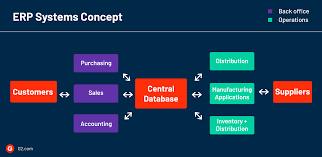ERP Concepts And Training
ERP (Enterprise Resource Planning) systems are integrated software platforms used by organizations to manage and automate various business processes across different departments. Here’s a brief overview of ERP concepts and training:
Key Concepts
- Integration: ERP systems unify various business functions like finance, HR, manufacturing, supply chain, and sales into a single system, facilitating data flow and collaboration.
- Centralized Database: A core feature of ERP is a central database that stores all relevant data, enabling real-time reporting and analytics.
- Modules: ERP systems typically consist of different modules tailored to specific business functions (e.g., CRM, HRM, SCM). Organizations can choose the modules that best meet their needs.
- Automation: By automating routine tasks, ERPs reduce manual work, minimize errors, and enhance efficiency.
- Scalability: ERPs can grow with a business, allowing organizations to add new users and functions as needed.
- Customization: While ERP systems come with standard functionalities, they can often be customized to fit specific organizational processes.
- Cloud vs. On-Premise: ERP solutions can be deployed on-premises or in the cloud. Cloud-based ERPs offer flexibility and scalability, while on-premise solutions may provide more control.
Training Considerations
- User Training: Training should be tailored for different user roles (e.g., end-users, managers, IT staff) to ensure everyone can effectively use the system.
- Hands-On Practice: Practical training sessions using the actual ERP system help users become familiar with functionalities.
- Change Management: Preparing staff for the transition to a new ERP system is crucial. This includes communicating the benefits and providing support during the changeover.
- Ongoing Support: Providing resources and support after the initial training helps users continue learning and addressing issues as they arise.
- Documentation: Comprehensive user manuals and training materials are vital for ongoing reference.
- Training Sessions: Consider workshops, webinars, and online courses to provide flexible learning options for users.
ERP Training Programs
- Vendor-Specific Training: Many ERP vendors (like SAP, Oracle, Microsoft) offer official training programs and certifications.
- Online Learning Platforms: Websites like Coursera, Udemy, and LinkedIn Learning provide courses on various ERP systems.
- In-House Training: Organizations can develop custom training programs led by experienced employees or external consultants.
Conclusion
Understanding ERP concepts and investing in proper training are essential for successful implementation and utilization of ERP systems, leading to improved efficiency, data integrity, and decision-making within an organization.
